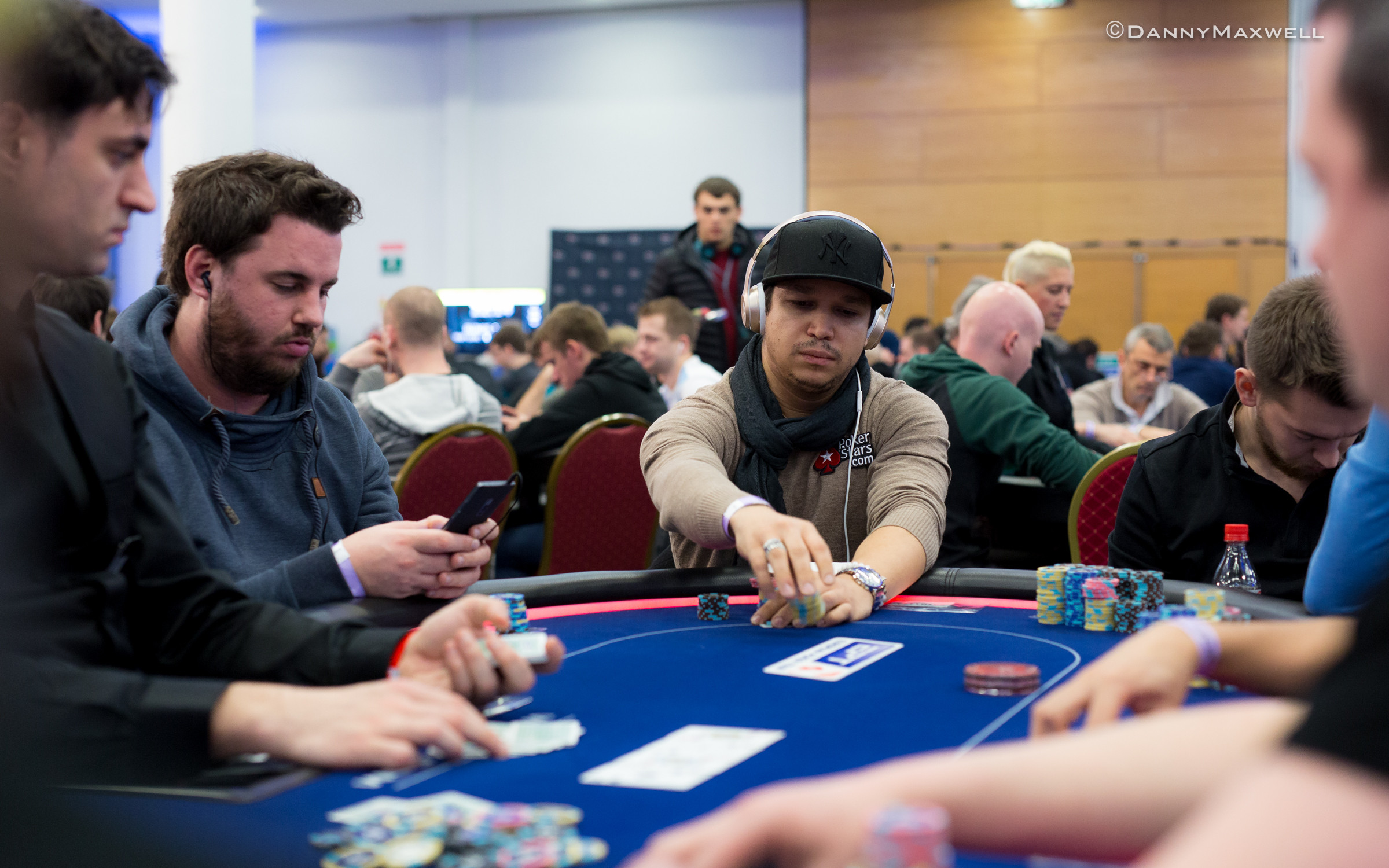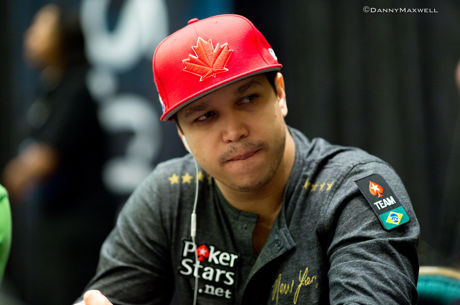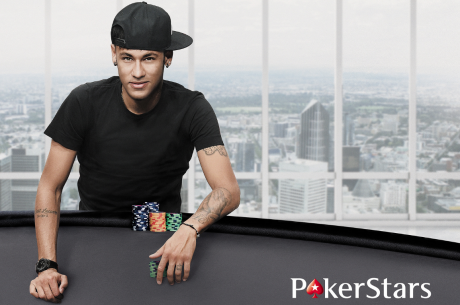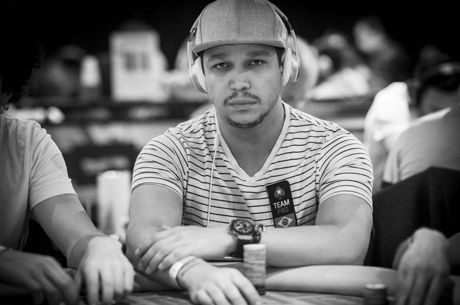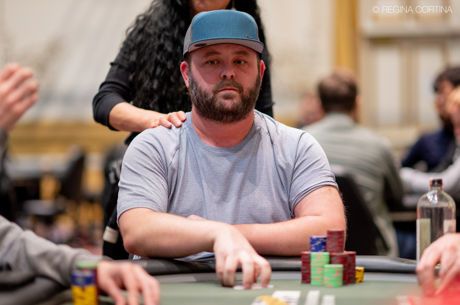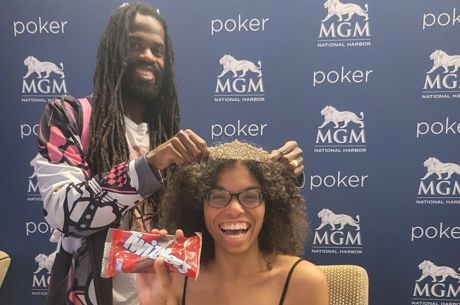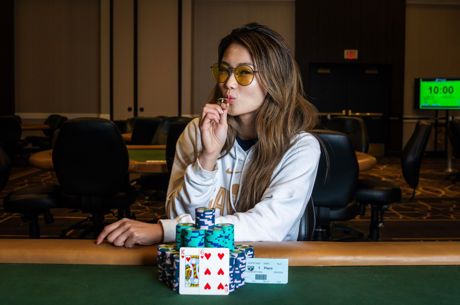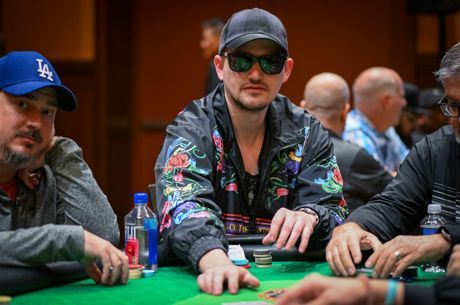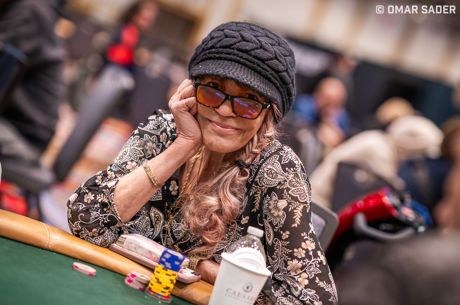?Vamos Felipe Ramos! From the Slums to Playing Poker For Millions With Neymar (Part 1)
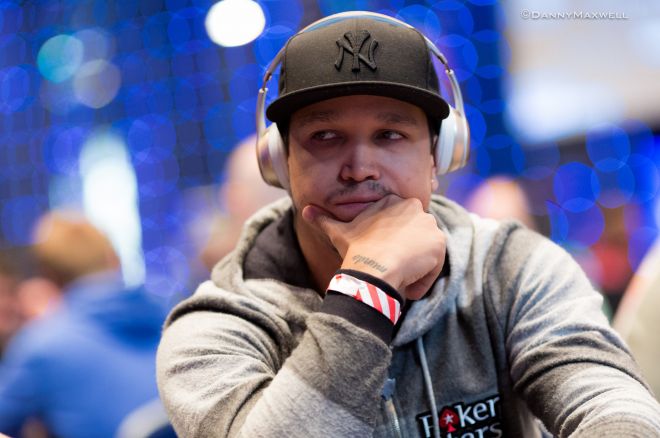
On Day 3 of the World Poker Tour Amsterdam, Felipe "Mojave" Ramos was sitting idle in the tournament room when a fan entered. "?Vamos Mojave!" he shouted at the top of his lungs, waving a Brazilian flag. Never before had they seen such behavior at a poker tournament in the Dutch capital. Besides some crazy antics at WSOP final tables in recent years, poker had not seen many such actions at all.
Poker is, and always has been, an individual game. But Felipe has changed that in a sense. With thousands of fans on Instagram, Twitter and Snapchat, he has an active following unprecedented in poker. They're not only enjoying reading about him, they are also actively rooting for him and cheering for his success at every opportunity.
The story of Ramos is a modern day Cinderella story or maybe a better analogy for the music-loving Ramos would be Drake's "Started From The Bottom." He started in the ghetto, but now hangs out with Neymar and plays �25,000 buy in tournaments regularly. Ramos worked himself up from the lowest echelons to that of PokerStars Team Pro and idol for thousands of Brazilians.
Growing Up in the Slums of S?o Paulo
Ramos was born in an extremely poor neighborhood of a S?o Paulo region called the Grande ABC. His father was a champion swimmer when he was young, but as he had no money and he couldn't find a sponsor to get to the Olympics, he made his money working as a technician.
The money Ramos Sr. made went straight to taking care of his kids, his own extended family and that of his wife. As soon as there was some money coming in, Felipe's father would try to make everyone's lives a little better.
His father's altruism did not go unnoticed.
"He's my idol. Big time. He taught me a lot of stuff," Felipe said.
Even at a young age, Felipe was already well aware of the sacrifices his father made, and in return, little Felipe tried to be as obedient as he could, doing exactly as his father told him. Felipe worked hard in school; there was no room or time to mess around.
Besides doing well in school, Felipe's passion was music. Everyone in Brazil, including Felipe, loved to play soccer, but Felipe's true love was playing instruments. He started studying music when he was 8 years old, learning all the instruments with the goal of becoming a musician one day. When he was 14, he started to do little gigs playing the cello in shopping malls and at kids parties to earn some money for his family.
While doing these small gigs, Felipe was still in school. There was no money for private education, so he was in public school, faced with the reality of fights, gangs and a poor education. Public school in Brazil was the "worst experience" in his life, but he looked up to his teachers.
"The teachers are heroes; what they do for what they earn... They are like role models," he said.
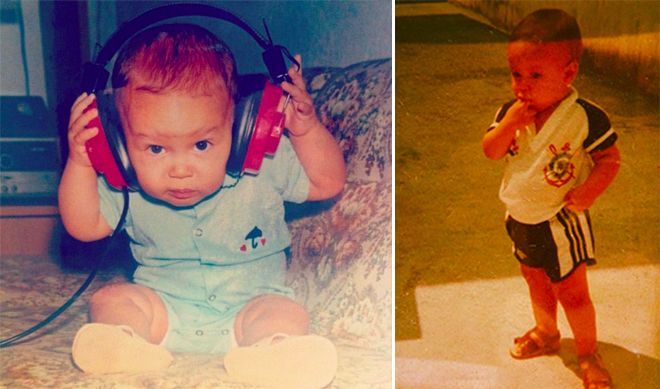
Felipe's father couldn't afford to put him in a private school, but he worked as hard as he could to give Felipe opportunities that would pay out years later. He got his son into private English classes at the age of 9.
"It gave me a head start in life," Felipe said. "It was key for me in more than one way."
Besides having an above average understanding of English because of the extra lessons, Felipe always excelled in math and he figured out how to do calculations on his own.
Despite being incredibly talented in music, Felipe's father convinced his son to direct his attention to a field with a "brighter future."
"Leave music for later," his father told him, directing him into the world of marketing and finance.
Coming from a public school in Brazil, it can be very hard to get into a good college in Brazil. Felipe tried to get in anyway, and for public school standards, he did extremely well. It still wasn't enough, though.
He narrowly missed acceptance into highly regarded program at the University of S?o Paulo by only two questions and had to divert to a different college, one that was easier to get into.
While many would have seen missing out on a top notch school by such a small margin as a huge defeat, Felipe remained focused on the end goal of doing well enough in life to take care of himself and his family. He didn't hang his shoulders, but instead walked away with a sense of pride after getting so close despite coming from such a poor background.
At the age of 18, Felipe got into college and passed a test to work as a third party contractor for a financial corporation based in the United States from Brazil, while studying simultaneously. After just three months, he was hired and promoted from trainee to manager's assistant.
Even though Felipe did so well in the finance world, his mind was still set on music. He satisfied that longing by playing in a band just about every night, after work and study were done for the day.
By doing so well at his job, he started to love it more and more. At the age of 21, before graduation, Felipe became the youngest manager in the history of the company. His father had shown him the way.
"He told me to start in the back office and make my way to the top from there," Felipe said. "I did it in two years. I liked it so much! First I felt lost in the world of finance, but I started to do well and really started to understand what I was doing."
Felipe still lived at home at the time but was doing well. While he had to spend his disposable income on suits for the first few months, he soon had enough money to help his family and buy what he wanted. For someone coming from an extremely poor background, a new world was slowly becoming his reality. Compared to his friends back in college, Felipe was by far the most successful with a great job and a nice car.
In the spare time he had outside of working and playing in the band, he completed the courses his company offered. He wanted to soak up all the information he could find and be as versatile as possible. He took wine tasting courses (so at least he knew what to order and how to drink like a gentleman when he had business dinners), he took courses on negotiation and presentation skills, he got his license to work in financial markets and he signed up for all the available English courses.
It would soon be time for another big change, one that would see him drop the formal attire again.
Playing Poker for the First Time
Felipe's boss would repeatedly ask him to join a poker game at his place, but Felipe never really had time to accept the open invitation. Having to commute to work 90 minutes through the nightmare they call S?o Paulo traffic each day, playing in the band six nights a week and studying and working the remaining hours, Felipe had no spare time.
After graduating, his boss once again asked him if he was interested in joining his poker game. With no band practice or other commitments that night, Felipe went for his first ever hold'em game. They played two 8-handed Sit & Go games on the boss's kitchen table that evening.
Felipe won the first one and finished runner-up to his boss in the second one. That kind of success early on appealed to Ramos.
"That got me hooked already; that got me really into the game!" he said.
"That got me hooked already; that got me really into the game!"
After the game, Felipe went on Amazon and ordered all the books on poker he could find. Books in Portuguese weren't around, but that wasn't a problem for Felipe as, unlike most of his countrymen, he was fluent in English.
He read all the books multiple times and tried his luck in several more home games before he started his quest to find a live poker room in S?o Paulo. He eventually found one, an illegal one at the time, and went to joust with Paulistanos of all different skill levels.
Arriving in front of the club for the first time, he ran into a friend he used to play Magic competitively with. The two soon found out about their shared passion for poker. His friend was already far better and more experienced in poker than Felipe was, but lacked a bankroll to play the game for serious stakes. The two worked out a deal that favored both. Felipe would receive poker lessons, and in return, he would take his friend to the game and stake him from time to time - the perfect symbiosis.
While his father probably hadn't foreseen Felipe using his English skills to get a head start in the world of poker, that was without a doubt what happened. While hardly anyone in the Brazilian poker community had any other resources beyond talking to each other and practicing, Felipe was reading all the books and forum posts on poker he could find.
"I had an advantage, no doubt about it," he said. "And that was my dad's vision when I was young."
He regarded Daniel Negreanu's blog as gospel and when the Full Contact Poker ganger wrote a blog in March 2006, advocating for players to try to learn all the games beyond no limit hold'em, he took that as a mandate instead of just friendly advice.
With less sleep and divided time between work, the band and poker, Felipe started playing poker every Friday in the poker club and online during the weekends. He was obsessed with the game and, looking back, his other two passions suffered because of it.
"I was very interested and invested in the game so much that I was losing focus on my job and the band. I really came to the conclusion I had to quit one of the three," he said.
While he was raking in some money playing poker, it was by no means enough yet to even think about quitting his job.
"I was losing focus on my job and the band. I had to quit one of the three."
The real decision was between poker and the band. Poker had become his biggest obsession by some margin. He was intrigued by the game, wanting to uncover all the possibilities and ways to outsmart his opponents. Eventually, Felipe decided to quit the band and go full force for poker.
Ramos was playing 10-and-20- Reais Sit & Go format games �� the equivalent of $3 and $6 in the underground poker room �� when he won his way into a R$600 (��$170) buy in event in 2006. He finished sixth for R$6,000 (��$1,700).
He played another R$5 qualifier and won a R$1,000 seat for the first season of the Brazilian Series of Poker (BSOP), finishing sixth again for another R$6,000. With R$12,000 (��$3,404) made in just two weeks and only about R$150 invested, Ramos was feeling pretty rich. Even for someone with a job like Ramos at the time, R$12,000 was serious money.
"Of course, I was still a complete donk at the time, but I think I was better than the average player," he said. "'Maybe I do really know how to do this!' is what I thought at the time."
Ramos's mind was set on poker, playing more and more online, and regularly at the now legalized poker club. In September 2007, he won a BSOP in his hometown of S?o Paulo for R$54,400.
"I won a huge trophy. Brazilians like extremely big trophies, even for small events. I came home and said, 'Dad, I'm a Brazilian poker champion!'"
His father knew Felipe was playing poker every now and then, but by no means had any knowledge of the actual state of affairs. Poker was no longer a hobby for Felipe; it was his obsession. And he was good at it.
But, scared of a lecture from his father, he lied about how serious poker was up until then. With a huge trophy in his hands, Felipe confessed and he shared his wish to go pro.
That didn't go too well.
"He said 'No way!' If you quit your job, you're going to kill us. We need your help; your sister is going to college. She needs a car. We can't risk you losing your job, it's too good for us," Felipe said.
Ramos Sr. and Jr. agreed Felipe could play poker on the side while maintaining his well-paid job at the bank. Ramos continued to excel playing poker, with several final tables at the BSOP and decent scores online.
Convincing Dad, Going Pro
By the end of the year, after becoming one of the top contenders each tournament, Ramos was offered a sponsor deal by BestPoker, an Ongame skin. They promised to send him to countries all over the world to represent the brand, but Ramos answered with hesitance.
He told them he wasn't even a pro and had to be back at his job on Monday. But to be fair, there weren't really all that many Brazilian pros at the time. With his consistency and dedication, he was as close to a pro as they would be able to find in S?o Paulo.
With some money saved up and his license to work in the financial markets as a backup, Felipe decided this was a chance he couldn't pass up. He once again talked to his father and promised to make sure there was a plan B, a plan to fall back on. And so, with the sponsor deal with BestPoker giving him the security he needed, he decided to go for it.
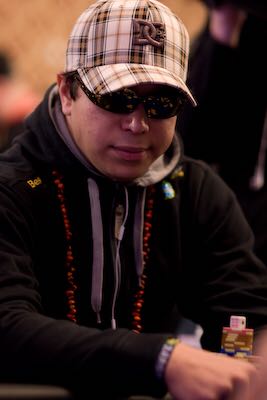
The first tournament he played with the BestPoker patch was the European Poker Tour stop in San Remo in 2008, the one Jason Mercier would end up winning. It was Felipe's first �5,000 buy in tournament and he made an extremely deep run, finishing in 13th place for a whopping �22,400 ($34,563).
He had done well, but he had missed out on the big prize. But, like when he had missed out on the top university on a two-question margin, Ramos did not view finishing in 13th place as a defeat. It was his first time playing outside of Brazil and his first �5,000 buy-in.
He had done well and that made him proud. His busted out in 13th place from a live streamed feature table. It was the first time a Brazilian had sat at a feature table of an EPT. The people behind the EPT would notice, as would thousands of fans in Brazil who watched the live stream that also featured William Thorson, Isaac Baron, Johannes Strassmann, Dario Minieri and Jonas Klausen. All of them were already well-established names at the time, but the digital rail was there mostly for Ramos, an unknown to the rest of the world.
After his deep run in the Italian coastal town of San Remo, Ramos traveled straight to Monaco for the EPT Season 4 Grand Final. He once again finished in the money, this time coming in 78th for �17,000. On top of that, he finished third in a �2,000 side event for another �44,400.
Ramos was welcomed back in Brazil like a true champion, even without any oversized trophies of his own. He was declared one of the best players in the country overnight and people started following him more closely. His father, though, wasn't yet convinced with the decisions his son was making and would rather see him return to the world of finance in S?o Paulo.
The Ramos family would traditionally spend Sundays at Felipe's grandmother's house, which proved a problem for Ramos. With the best tournaments online being held on Sunday, like the Warmup and Million on PokerStars, Felipe didn't want to miss out.
He clashed with his father once more.
"'What is more important than your family? What's more important than family tradition? This is just the start and soon we'll never gonna see each other again! Don't lose yourself!' he would say," Felipe remembered.
Despite the big objection, Felipe wasn't going to budge. He told his father that he would visit his grandmother each Saturday instead of going out, but Sunday was for online poker from here on out. With his star and skill level rising, he couldn't miss out on the week's most important day for online poker. His father reluctantly agreed.
That very Sunday, Felipe played a big session online. By the time his father got home from grandma's family gathering, Felipe was heads up in the PokerStars $109 Rebuy, a huge tournament at the time. His father knocked on his door and asked him if it was worth missing out on the family tradition.
Felipe explained how it was $100 to buy in and that a lot of people had done that but he and one other player remained. Ramos went on to explain that he would get $50,000 if he busted now. His father's reaction was a classic one.
"He said, 'Lose! Lose!' He thought if I would continue to play I was still able to lose. 'No dad,' I said, 'If I win, I win $75,000. If I lose, I get $50,000. I can't lose that anymore!'"
With those dazzling numbers sinking in, his father's reaction transitioned to one of disbelief.
"He said, '50,000 dollars on a fucking Sunday behind your computer?
'50,000 dollars on a fucking Sunday behind your computer? That's more than my yearly salary!
Fuck! Let's play poker!'
That's more than my yearly salary! Fuck! Let's play poker! He was on board and he sat next to me for the remainder of the tournament," Felipe remembered.
Felipe ended up getting it in with king-jack to ace-ten and failed to make a suckout to get the fairytale ending the story deserved. Ramos wasn't sad he had lost the heads-up battle; he was over the moon finishing runner-up with his father now supporting him.
"That was a great experience!" he said. "To play with my dad and to win so much money, it was incredible!"
Ramos was quick to explain the concept of variance to his father, pressing that not every Sunday would be as lucrative a day as the one he had just witnessed. Despite those warnings, his father was now on board with the decisions his son had made. He had seen firsthand that his son was invested and knew what he was doing.
[URL="https://www.smsmarketingexamples.com/news/2016/11/felipe-ramos-mojave-brazil-poker-neymar-part-2-26362.htm"]read the second part of ?Vamos Felipe Ramos![/URL] as we take a look at Ramos specializing in Omaha, hanging out with Neymar Jr. and going deep in the WSOP Main Event.
